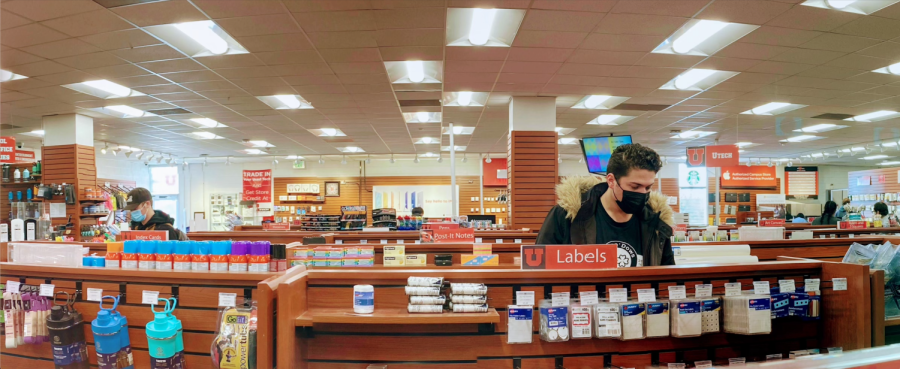Hibben: Mask Mandates Are a Big Relief
Students shopping at the Campus Store at the University of Utah in Salt Lake City, on Friday, Jan. 14, 2022.(Photo by Langley Hayman | The Daily Utah Chronicle
January 19, 2022
Following the new 30-day mask mandate issued for Salt Lake County on Jan. 8, the University of Utah was finally able to require and enforce masks indoors on campus. Previous attempts to mandate masks on campus were stopped by state law which prevented any state entity from mandating masks or vaccines. However, this new public health order allows the University of Utah to remain protected during the rise of the new, highly contagious Omicron variant.
The University is also requiring students to be fully vaccinated, and asking students to test weekly, even if asymptomatic. More testing centers are being set up all over campus to accommodate this demand. Self-serve testing locations are a new solution to get tested frequently and without an appointment.
While the steps to mask up may feel like a step backward, wearing a mask is a simple, effective way to protect ourselves and each other. With almost 90% of our campus vaccinated, wearing masks is sure to help stop the severity of Omicron. It’s part of a layered defense plan that will keep us safe and continuing in-person classes.
Omicron and Its Dangers
The Omicron variant is expected to be more contagious than the original strain of the SARS-CoV-2 virus. The severity of the virus is still unknown, however, it is rapidly spreading across Utah, and on campus. Between Jan. 7 and Jan. 10, over 24,000 new positive cases were reported. On campus, even while most students were away on winter break, the University saw a dramatic rise in cases. These numbers are expected to grow as students, faculty and staff come back to school.
Anthony Fauci, White House Chief Medical Advisor, reported an “almost a vertical increase” nationally in positive cases, as over 1 million positive results were reported on Jan. 3. This new strain is so contagious that from many students I have talked to, contracting COVID-19 seems “inevitable.” While those who have little to no symptoms may not feel the effects of COVID-19, many have and will be hospitalized due to this variant. Increasing hospitalizations limit our already strained and over-worked healthcare workers. Nationwide, beds available in hospitals are decreasing to dangerously low numbers, affecting not just those who have COVID-19, but also those who require any emergency service. Without beds, no one will be able to receive care for seizures, heart attacks or shootings.
Wearing a mask is the best way to ensure not only you don’t get sick, but also that anyone who has a medical emergency can access care.
“A Pandemic of the Unvaccinated”
Other experts have predicted that the variant will set record positivity rates in January but might have less hospitalization. This is an encouraging sign demonstrating the effectiveness of vaccines. The Utah Department of Health reports that since the release of vaccines, 11,000 hospitalizations were of those who were unvaccinated, while only 2,000 were vaccinated. The vaccine is proven to not only help prevent infection but also reduce symptoms if you test positive.
While Omicron seems to be less severe due to vaccination numbers, if you are unvaccinated, you should be concerned. Without protection from both infection and severity of symptoms, you are completely unprotected against a highly contagious, unstudied variant. We still don’t know much about the long-term effects of having COVID-19.
We all know that many unvaccinated individuals contract asymptomatic COVID-19, but we should also remember that breakthrough cases for vaccinated individuals have occurred. That’s why it’s crucial to test regularly and wear a mask in case you are unknowingly spreading it to others.
Benefits of Masks
Whether you are vaccinated or not, masks are a great additional step to take to protect you and your loved ones. Multiple studies have reviewed and proved the effectiveness of masks to prevent COVID-19.
I’ve noticed it’s almost impossible to maintain social distance in my in-person classes, so mandatory masks in class have overall relaxed my own anxiety about Omicron’s spread. For those of you who have loved ones who are high-risk individuals, masks are an easy step that makes speaking to your classmate or attending a forum less risky.
Some masks are better than others. The C.D.C. released a statement saying that cloth masks are not as effective as surgical masks in protecting against COVID-19. N-95s are still the best protection, but well-fitting surgical masks and K-95s are also a good option.
I also must recognize the many students on campus who continue to not wear masks or wear masks improperly simply for the sake of defiance. To those, I would say: grow up. It is not brave or admirable to risk your and others’ health, it’s stupid. This pandemic continues in concerning severity because of individuals like you. The only way we will be able to continue classes in person is if we work together as a community to compassionately care about one another. It’s the adult thing to do.
While it may be easy to feel like we are simply returning to March 2020, these mask mandates are an encouraging sign that we, as a state, are learning from our mistakes. We’re layering up multiple protections against COVID-19 so that we can stay on campus safely. There’s no harm in a piece of fabric over your face, so let’s all do our part for a brighter future.









